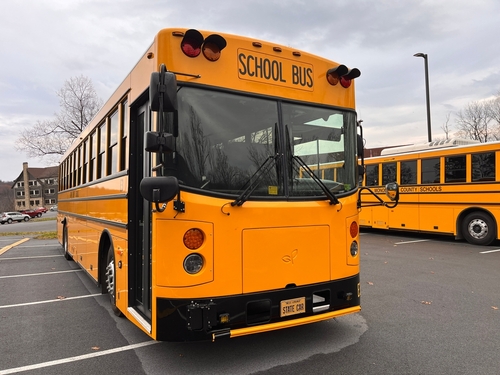
On Wednesday, U.S. Environmental Protection Agency (EPA) Administrator Michael S. Regan said his agency would continue to provide funding for electric school buses after unprecedented demand.
Regan made his remarks at the Wabaunsee USD 329 School District in Alma, Kan., where he was on-hand to celebrate the school district’s receipt of two electric school buses purchased with the help of grant funding provided by the EPA through its Clean School Bus (CSB) program.
“We are moving faster than ever to accelerate the transition to electric and low-emission school buses, and new electric school buses in rural school districts like Wabaunsee USD 329 are a shining of example of what we can accomplish when we invest in America,” said EPA Administrator Michael S. Regan. “The Biden-Harris Administration is committed to building on this work and making investments accessible to more rural communities by partnering with electric utilities who have pledged to support school bus electrification.”
The EPA was authorized to spend $5 billion between FY 2022 and FY 2026 on replacing diesel school buses with low- to zero-emission alternatives. In May 2022, the EPA launched a competitive funding opportunity for $500 million in rebates to school districts. After getting an overwhelming response, the EPA nearly doubled the funding amount for 2022 and awarded $965 million to 400 school districts for more than 2,500 clean school buses.
Wabaunsee USD 329, was one of those awardees, receiving more than $790,000 in rebates for two Type C electric school buses already in service. School district officials said they partnered with Alma’s Municipal Utility to deploy electric charging infrastructure to transition to electric vehicles.
“We are grateful for being chosen to receive this support for our students through the Clean School Bus program. This grant allows us to transport students cleaner and more safely to and from school. By the same token, we get the added benefit of cost-savings on transportation, redirecting funds normally spent on operations back into instruction,” said Dr. Troy Pitsch, USD 329 – Wabaunsee Superintendent of Schools.
Regan pledged to promote a seamless collaboration between school districts and electric utility providers, and ensure the successful deployment of electric school buses nationwide.
“Rural and small-town electric providers have a long tradition of assisting their communities with using electricity to improve quality of life for the local people they serve. The Beneficial Electrification League is honored to help its stakeholder utilities ensure that schools and the children they educate have a positive experience with electric school buses,” said Keith Dennis, President of the Beneficial Electrification League, a non-profit that assists rural electric